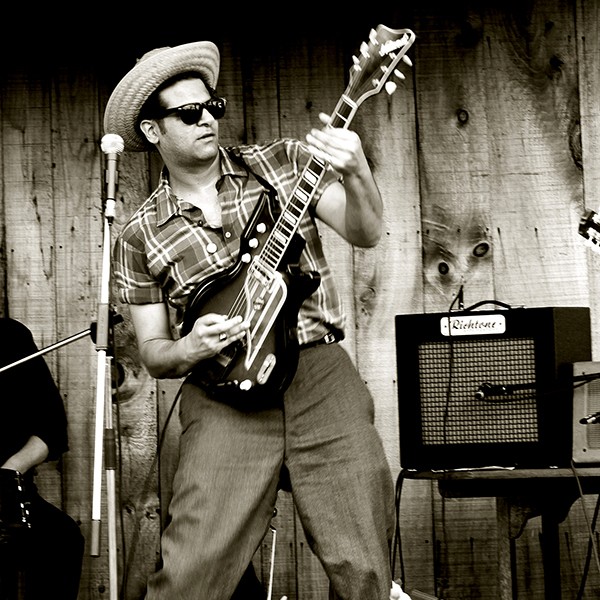With an impressive list of traditionalists, revivalists, and torchbearers, including Lee Rocker of the Stray Cats and Sonny Burgess and his Legendary Pacers, the first installment of Memphis’ International Rockabilly Festival promises to deliver something no other music festival in the world can: two solid days of live music and nostalgia, all taking place a few hundred feet away from Sun Studio.
On March 3, 1951, Willie Kizart’s, water-damaged guitar amp malfunctioned, giving a recording of Ike Turner’s “Rocket 88” a distinct and fortuitous buzz. Two years later, a starry-eyed kid named Elvis Presley walked in the front door looking for an audition, and the corner of Union and Marshall officially became ground zero for the big bang of rock-and-roll. Howlin’ Wolf, Rufus Thomas, Johnny Cash, Jerry Lee Lewis, Carl Perkins, and Roy Orbison all launched recording careers at Sun. Now, 64 years after Kizart’s amp went all fuzzy, festival organizers Darrin Hillis and Mark Lovell are bringing rock-and-roll back to the place where it all started.
Hillis says he has no idea why it’s taken so long for someone to finally organize a major vintage music event in Memphis during Elvis Week, when tourists flock to Whitehaven to visit Graceland and celebrate the King’s life and legacy.
“We’re selling tickets all over the world, from Australia to Japan,” Hillis says. “A whole movie crew is coming from the United Kingdom.”
Hillis, who first partnered with Lovell to launch the Delta Fair in 2007, isn’t from Memphis, but he says he’s always been drawn to the city and its music. It started when he was only a kid living in a trailer park in Gainesville, Florida, playing Jerry Lee Lewis singles on his sister’s record player. “I wore it out,” says Hillis, who was encouraged to finally act on a longstanding desire to organize a rockabilly festival by Memphis’ rocket-powered piano man Jason D. Williams and his wife/manager Jennifer James.
“We really want this to be an experience,” Hillis says. “We want people to feel like they are walking back in time.” To achieve a sense of temporal displacement, Hillis has organized a hot rod car show and offered discounts to all festival vendors who dress in a vintage style reminiscent of the 1950s. To help complete the vibe, tattoo artists will be available to give music fans the ultimate souvenir. Those looking for a less permanent remembrance can visit pinup photography specialists, the Memphis Bombshells. They’ll be giving hair and makeup tips and performing retro makeovers in the Premiere Palace.
In addition to the shows, fans hoping to get up close and personal with their favorite rockabilly artists will be able to visit the Dizzy Bird, a 70-seat venue housed in the former Hattiloo Theatre. Selected performers will be available before or after their main-stage shows to tell stories, sign books, and play songs in a more intimate environment.
Sun Studio sax man Ace Cannon is scheduled to perform, as is Johnny Cash’s longtime drummer W.S. Holland. The first-wave rockers are playing alongside notable innovators like Memphis guitar prodigy Travis Wammack, whose quirky instrumental recordings “Scratchy” and “Fire Fly” inspired a generation of hot-lick guitar pickers including Led Zeppelin’s Jimmy Page. The schedule is rounded out by contemporary Memphis players like Nancy Apple, Jason Freeman, and the Motel Mirrors, featuring John Paul Keith and Amy LaVere, who played rockabilly star Wanda Jackson in the 2005 Johnny Cash biopic Walk the Line.
Memphis music has few champions as outspoken as Texas troubadour Dale Watson, who is scheduled to perform Sunday evening at 6 p.m. Watson’s based out of Austin, but since 2001, he’s recorded five albums’ worth of material at Sun Studio.
“I’ve been recording at Sun for almost 20 years now,” says Watson, who launched the Ameripolitan Music Awards in 2014 as a means of recognizing artists performing original music inspired by the sounds of traditional honky-tonk, rockabilly, and western swing. “Something about that room is so magical. A lot of it’s because of Elvis, Johnny Cash, and Jerry Lee’s having been there. But even more, it’s just the sound that you get recording in that room. It’s like nowhere else. And the talent that came to perform there made the perfect storm.”
The Rockabilly Festival also showcases the talents of newly-minted octogenarian and human jukebox Sleepy LaBeef, who takes the stage Sunday afternoon at 4:30 p.m. LaBeef wasn’t a Memphis artist, but he was definitely around for the “perfect storm” Watson describes.
“At the beginning, it was all country, hillbilly, rhythm and blues, bluegrass, and the old foot-stomping, hand-clapping gospel rhythms all put together,” says LaBeef, recalling his early days on the road with all of the original rockabilly artists.
“I never made a record in that building there in Memphis,” says LaBeef, who became a Sun recording artist in the 1970s, after the label moved to Nashville. “Now, in 1954 and 1955, I was opening some shows for Elvis, Scotty [Moore], and Bill [Black]. We also did some shows with Fats Domino, Chuck Berry, Buddy Holly, Gene Vincent, and all these different people.
“We were mixing a lot of stuff together back then to see if it worked,” LaBeef says. “And if it worked, we done it.”

